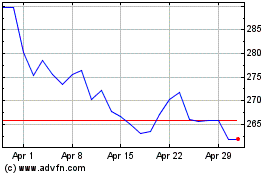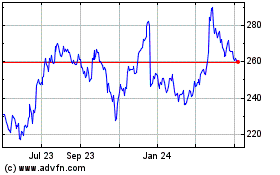By Doug Cameron
The pandemic has revealed shortcomings in global supply chains
and forced business to make logistics a bigger strategic priority.
Successfully delivering Covid-19 vaccines will test manufacturers
and shippers on what lessons have been learned.
"If 50 million doses were available today, could we distribute
them?" asked Glyn Hughes, head of cargo at the International Air
Transport Association, a trade group. "The answer is almost
certainly 'No', for every jurisdiction."
The air-cargo industry is making plans for delivering as many as
20 billion Covid-19 vaccination doses, even before regulators have
approved any of the multiple treatments under development. Shippers
say they are having to plan without knowing exactly how many
vaccine doses they'll have to ship, where they will be manufactured
and how cold they have to be kept.
Pharmaceutical companies and shippers say they expect the bulk
of vaccine supplies to be transported by air. Cargo-airline
executives are working on a delivery schedule that assumes initial
batches become available during the traditional peak season for
shipping that runs from fall through early February.
Carriers such as FedEx Corp. and the DHL arm of Deutsche Post AG
have started preparations such as introducing new
temperature-monitoring systems to track future vaccine shipments.
United Parcel Service Inc. and Deutsche Lufthansa AG are building
"freezer farms" combining multiple refrigerators at their airport
hubs to store vaccines in transit.
Yet cargo flights are fast filling up through February with
bookings for consumer electronics, apparel and industrial parts
through the holiday season and new year, said airline executives.
This year's peak season is expected to include a lift from the
delayed iPhone 5G from Apple Inc. and Sony Corp.'s PlayStation
5.
"We're planning for the mother of all peaks," said Don Colleran,
president of FedEx's express division, on an investor call last
month.
Airlines said they would make room for essential supplies such
as vaccines, just as they have for personal protective equipment
throughout the pandemic.
Most of the potential vaccines have to be kept at a low constant
temperature throughout the journey to prevent spoiling, according
to cargo experts. These fall into two temperature ranges--around
freezing and about minus 70 degrees Celsius--with very different
transport and storage requirements.
Pharma executives said spoilage rates for other vaccines during
transport range from 5% to as much as 20% because of poor
temperature control.
"This is going to be one of the biggest challenges for the
transportation industry," Michael Steen, chief operating officer at
Atlas Air Worldwide Holdings Inc., said in an interview. Atlas is
one of the largest cargo airlines, flying freight on behalf of
customers including Amazon.com Inc. and DHL.
Cargo executives said they expect it will take two years for a
vaccine to reach all of the world's population, with particular
challenges in some emerging markets where infrastructure is
limited.
The air-cargo industry isn't starting from scratch. Pharma
products have been one of the fastest-growing and most profitable
cargo types over the past decade. Shippers have developed
increasingly sophisticated supply chains for vaccines in recent
years, especially for the flu. Gene therapies, another booming
area, already require transport and storage at very low
temperatures.
Planning flu-season vaccine deliveries typically starts months
ahead and includes analyzing which routes and airports carry the
highest risk for delays and spoilage, said Larry St. Onge,
president of DHL's life sciences and health care unit.
DHL is applying that analysis to potential Covid-19 vaccines,
which will have more-urgent delivery needs and far larger
volume.
IATA estimates transporting a single dose to the global
population would require the equivalent of 8,000 fully-laden Boeing
Co. 747 flights, based on dimensions for vials and packaging
provided by pharma companies. A recent study by DHL and McKinsey
& Co. pegged demand at 15,000 flights, while including syringes
and protective equipment for medical staff would increase the
cargo-space requirement.
Pharma shipments already account for around 1.9% of global
air-cargo volume, said IATA, and adding Covid-19 vaccines could
double that share. Not every freighter jet is able to handle very
cold cargo because of regulatory restrictions on how much dry ice
they can transport to cool them, said executives.
Air-cargo capacity is already tight, with flights flying fuller
than before the pandemic started. International air-cargo capacity
was down 32% in August from a year earlier while demand was only
14% lower.
The pandemic-driven travel downturn has removed from service
hundreds of passenger jets and the belly space that once carried
cargo. More freighters are joining the fleet, with Atlas returning
stored 747s from the desert and passenger airlines converting
around 100 planes to carry freight in their cabins.
Covid-19 vaccine makers such as Pfizer Inc. have already begun
manufacturing doses to be ready for shipment should regulators
authorize their use. However, the uncertainty over approval timing
and shipping requirements has meant they have stopped short of
booking space on cargo flights, said airline executives.
The U.S. government last month outlined its initial plans for
distributing vaccines domestically under its Operation Warp Speed
program run by the Department of Health and Human Services and the
Pentagon, as well as the Centers for Disease Control and
Prevention.
McKesson Corp., one of the world's largest drug wholesalers, has
been contracted by CDC to ship some vaccine types in the U.S. It
hasn't detailed how they would be transported, and air-cargo
executives said they haven't signed any Covid-19 vaccine-related
deals yet. McKesson declined to comment.
President Trump said during the opening presidential debate last
week that the military would support distribution of the vaccine.
The Pentagon said it doesn't expect to have to use military
transport aircraft, except to very remote areas. "Our best military
assessment is that there is sufficient U.S.
commercial-transportation capacity to fully support vaccine
distribution," said a spokesman.
Write to Doug Cameron at doug.cameron@wsj.com
(END) Dow Jones Newswires
October 05, 2020 05:44 ET (09:44 GMT)
Copyright (c) 2020 Dow Jones & Company, Inc.
FedEx (NYSE:FDX)
Historical Stock Chart
From Mar 2024 to Apr 2024

FedEx (NYSE:FDX)
Historical Stock Chart
From Apr 2023 to Apr 2024
